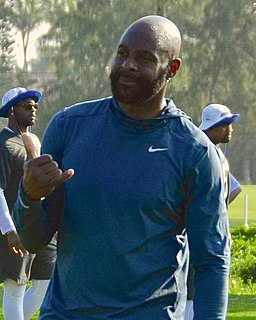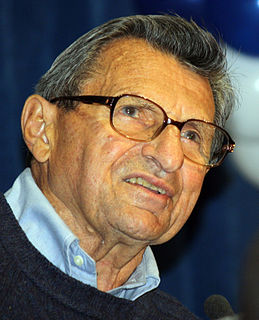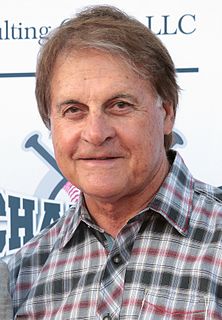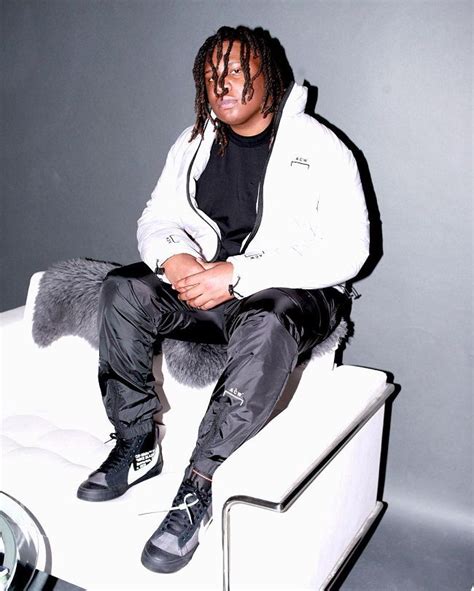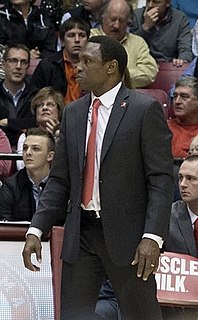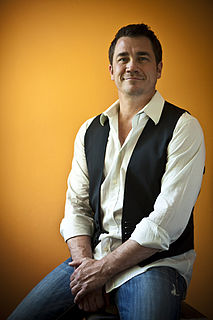A Quote by Jerry Rice
Coming from the South, I just felt you had to work just a little bit harder. It was not going to be handed to you. I’d get the letters from all the major schools but no one came out to talk to me face to face until this small, dominant black school, Mississippi State Valley University sent a coach out to me. I had a chance to talk to him and he said, ‘Hey Jerry, we’re going to be doing some great things at Mississippi Valley State University and we would love to have you there.’
Quote Topics
Bit
Black
Came
Chance
Coach
Coming
Doing
Dominant
Face
Face To Face
Felt
Get
Going
Great
Great Thing
Great Things
Had
Handed
Harder
Hey
Him
Jerry
Just
Just A Little Bit
Letters
Little
Little Bit
Love
Major
Me
Mississippi
Mississippi State
Out
Said
School
Schools
Sent
Small
Some
South
State
Talk
Talk To Me
Things
University
Until
Valley
Work
Would
Related Quotes
Mostly I want to talk positive; I wanna talk about a bunch of great kids that I coached and made me look good and the university that I've seen grow from a cow college, which it was, only 12,000 people, and when I came here, we weren't at Pennsylvania State University, we were at Penn State College.
When I got out of the military, I finished up my education at the University of North Carolina at Wilmington, and I had some mentors who said, 'You got what it takes. You should consider going to graduate school, getting a Ph.D. in neuroscience.' I didn't think I had what it took until somebody who had a Ph.D. told me I had what it takes.
My father came from Germany. My mom came from Venezuela. My father's culturally German, but his father was Japanese. I was raised in New York and spent two years in Rio. My parents met at the University of Southern Mississippi, and they had me there, and then we moved to New York. I'm not very familiar with Mississippi.
I just had some of the same journalists that panned Electric Circus at the time, they just listened to Universal Mind Control and they loved it. And then they went back to tell me that Electric Circus, if it came out at today, it would've had a different reception. One of them told me, "Hey, man. You need to bring it out again." And I said, "Hey, it's cool. It is what it is."
The only thing we took out was the Constitution of the State of Mississippi and the interpretation of the Constitution. We had 63,000 people registered on the Freedom Registration form. And we tried from every level to go into the regular Democratic Party medium. We tried from the precinct level. The 16th of June when they were holding precinct meetings all across the state, I was there and there was eight of us there to attend the meeting, and they had the door locked at 10 o'clock in the morning. This is what's happening in the State of Mississippi.
To me, acting used to be just, 'Get my face out there, get girls, make a little bit of money, make my mom proud.' It was just like sports. But there were moments in 'Moonlight' that I really felt like I had to know why he is the way he is. Or just people in general - why this person walks around with a frown on their face instead of a smile.
I came home [after funerals] and I thought if I go back to California, where I had a small house, I don't think I'll ever come east again. So I decided to stay and go through the halls and stairways, talk to Gilda Radner, holler, express some of my anger and make sure there were no ghosts in the hallways that I should ever be afraid of.And then I found out - it sounds strange, but I found out she had left me the house. We never talked about her dying and what she was going to leave me or I would ever leave her. We just didn't talk about those things.
And what are you doing here, Nicholas? Decided to watch me sleep?" "Yes," said Nick, and bowed is head over his sword again. He had tissues, oil, and sandpaper laid out on the windowsill in front of him, and a little stone block he was passing his sword up and down, very carefully. "I came to gaze upon your sleeping face. Only you had the blanket over your head, so I just had to gaze at a lump I thought was your sleeping face, and that turned out to be your shoulder. Which just wasn't as special." ~Nick and Mae
I thought I would make it (to the NBA). I believed that I would make it. But I had a Plan B. I was going to get my Master's degree at Tulane University had it not worked out. I think the pressure of making it wasn't on me as great as some other players that had no other options. I was going to do something special in life and I wanted to play in the NBA. I had a backup plan but I went full speed ahead with my Plan A.
